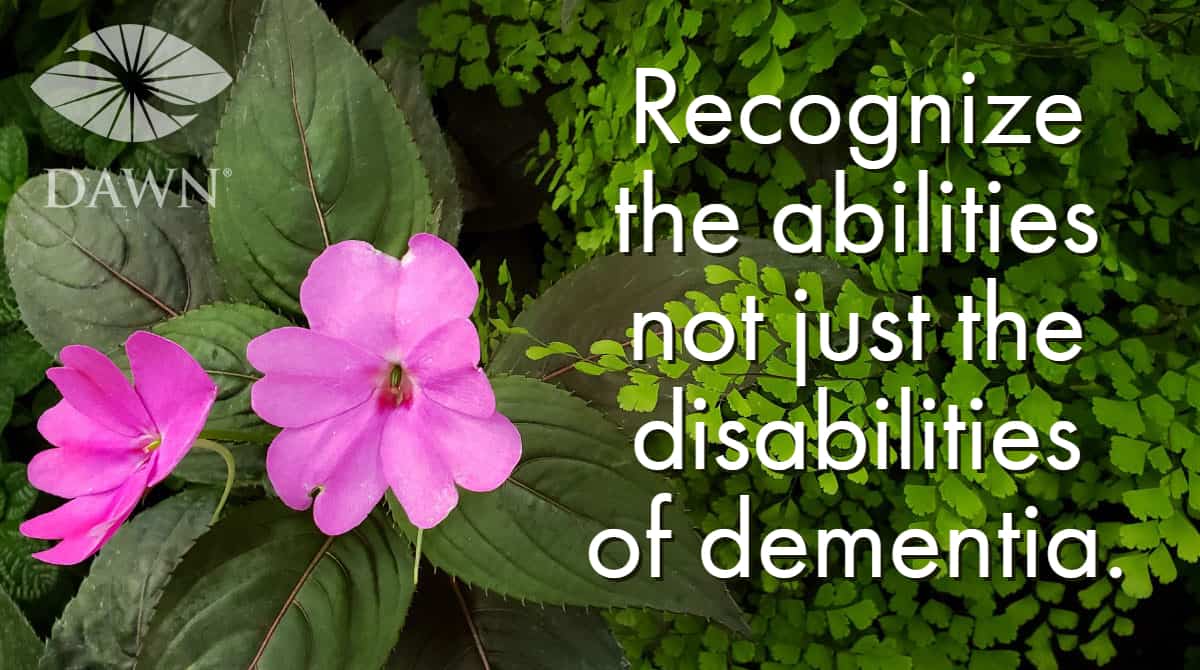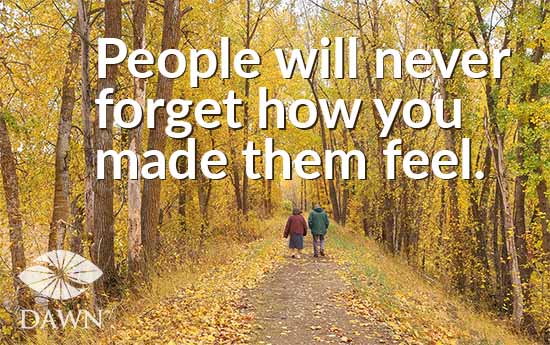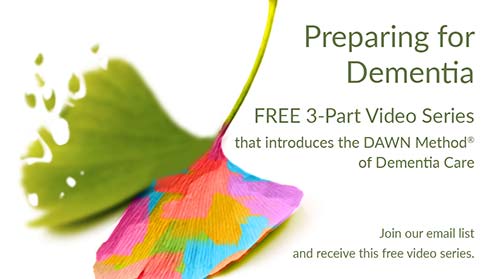Guide to Caring for Someone with Dementia at Home
A dementia roadmap for families
When you suspect that your loved one is experiencing dementia, or hear the diagnosis, it can be overwhelming. But though you may grieve the loss of how things were before, not all is lost. Caring for someone with dementia at home is very possible. The DAWN Method® will show you how. You might want to bookmark this free guide to dementia now so you can reference it often.
There is hope in dementia. It lies in how we provide care.
Compare DAWN coaching, classes & booksWhat does it feel like to have dementia?
The same person, traveling an unexpected path…
Someone who is experiencing dementia is still the same person; they are just struggling to interact with you and the world in a different way now that they are losing some very specific cognitive skills. Once you learn how to capitalize on the skills they do not lose, you’ll both enjoy your time together more. We’ve put together this dementia roadmap with a few tips on how to care for someone at home who’s experiencing Alzheimer’s or dementia.
If you want to get an idea of what dementia is like from your loved one’s perspective, read Judy’s article Blog article: “Blog article: What is it like experiencing dementia?”

1—Find out how to prepare for dementia
Sign up for the DAWN newsletter and get the free video series, Preparing for Dementia. In these three short videos, Judy Cornish gives an overview of how you can equip yourself and your loved one for the least stressful journey as you embark on this new path together.
2—Understand the skills kept and the skills lost in dementia
This is the key to supporting a loved one on the dementia journey: understanding which skills they’ll keep and which they will lose. Once we understand what someone can and cannot do, we can avoid setting them up for failure and causing them embarrassment. And once we know how their abilities will change, we can change our own expectations to match and provide true support. Read more about the skills kept and lost to dementia.

3—Understand the emotional needs caused by dementia
It sounds obvious, but it’s easy to forget this when we become dementia care partners: the way we behave reflects how we feel. And how people feel becomes critically important when they’re losing rational thought, because it’s rational thought that helps us control our behavior. Read more about how emotions affect our behaviors when we are experiencing dementia. You may also want to search our blog for Judy’s series on anger and dementia.
“I do not see the problems caused by dementia as ‘dementia-related behaviors’, but instead as the emotional distress that people experience when they undergo progressive cognitive impairment.”

Judy Cornish
Creator of the DAWN Method
4—Communicate better with someone experiencing dementia or Alzheimer’s
Conversation is essential to our wellbeing yet something we take for granted, and when people are experiencing dementia it becomes increasingly challenging. As they start having difficulty following conversations, they begin to withdraw out of fear of embarrassment. Their friends often back away, too. However, there are ways to help someone take part in conversation—and succeed—despite memory loss.
In this article you’ll find some tips on how to make a phone conversation more enjoyable for both of you: Blog article: “Dementia and phone conversations.”

5—Know how to use your superpower (you can control their moods)
Dementia creates paradox. You will find that for the first time in your life, you actually are shaping the mood of someone else—and you can learn how to do so in a positive way. Due to the skills lost to dementia, your loved one is becoming unable to set aside a bad mood or choose a positive one. The DAWN Method teaches how to create happier moods and recapture companionship. Read more about shaping moods in dementia.
6—Things to think about before arranging a move
When someone is experiencing dementia at home, they are relying on automatic thinking scripts and muscle memory to do things such as finding the bathroom at night, making coffee, and running a load of laundry. These tools of mindlessness are enhancing their ability to function. Before you move them (or anything in their home) read the article “Maximizing the “Assisted” in Assisted Living.”

7—Work with your grief through understanding what is not lost
When there is a diagnosis of dementia, at first we see only losses, but all is not lost. It is very important to acknowledge our grief, yet just as important to learn about the skills and strengths our loved ones will continue to use.
Stories of how others have found hope in dementia
In our blog article, Blog article: “We Can Work With Dementia,” Judy cites an article from the New York Times about Geri and her husband Jim. You’ll find encouragement in this couple’s choice to accept Geri’s condition, defy the stigma surrounding dementia, and continue living life to the fullest.
If you are struggling with grief, you may find Judy’s conversation with Hanh Brown of the Boomer Podcast helpful. Hanh and Judy have a candid discussion about acknowledging grief when caring for a parent with dementia (available on our dementia podcast guide).

Take the next step to equip yourself for the journey…
We know it’s daunting, but we also know that we can make the journey less stressful for both of you. Here are three options:




